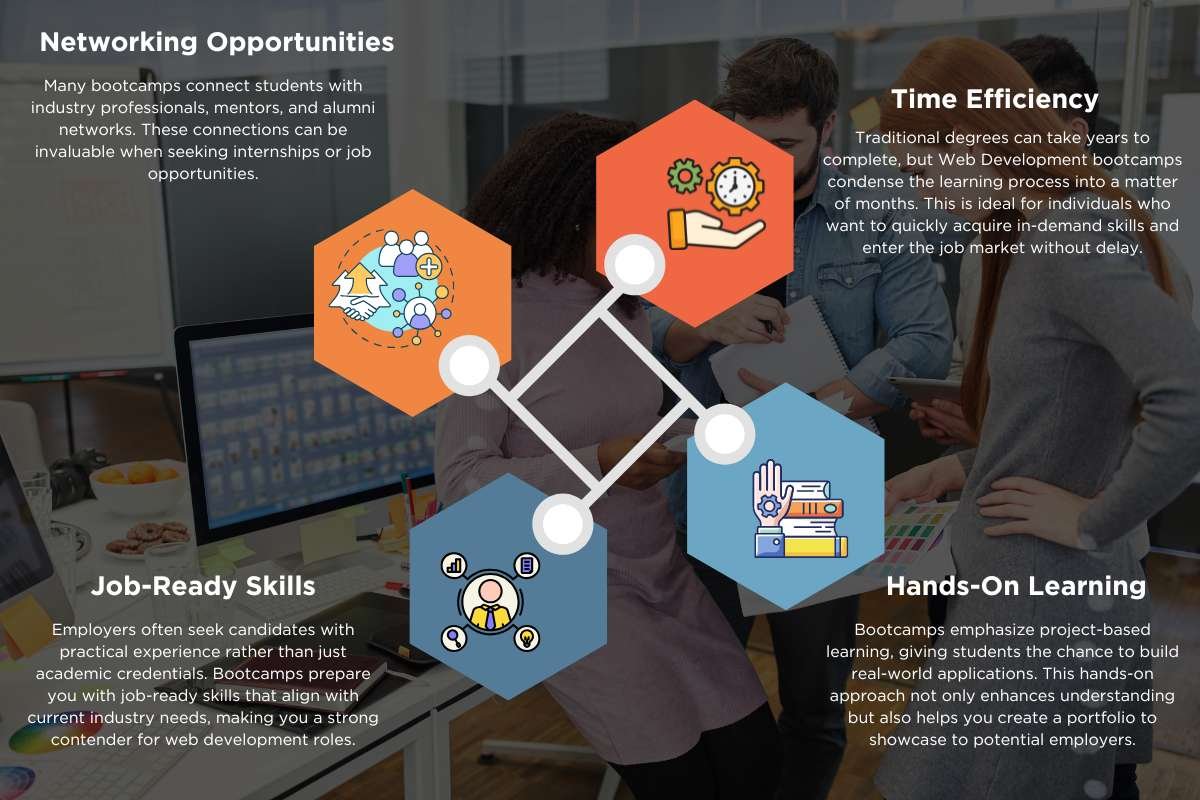A few years ago, I was stuck in a job that didn’t excite me. I’d always been curious about tech, but I had no idea where to start. One day, I came across something called Web Development bootcamps, and the idea of learning coding skills quickly sounded perfect. It felt like the push I needed to try something new.
I signed up, not knowing what to expect. The experience was intense but exciting. From building small websites to working on real-world projects, I could see my skills improving every week. By the end, I had the confidence to apply for web development jobs—and I landed one. Looking back, joining a bootcamp was one of the best decisions I’ve made.
If you are thinking about starting a career in web development, Web Development bootcamps can be a great way to get there. Let’s see why they have become so popular and how they can help you too.
What Are Web Development Bootcamps?
Web development bootcamps are intensive training programs designed to teach you the essential skills required for a career in web development. These courses focus on practical application rather than theoretical concepts, which means you will spend more time coding and building projects rather than just studying from textbooks.
Typically lasting anywhere from 8 to 24 weeks, depending on whether you choose a part-time or full-time schedule, these programs cover topics like HTML, CSS, JavaScript, and modern frameworks like React and Angular. Some also include back-end development with technologies like Node.js, Python, or Ruby on Rails.
With the rise of no-code tools, some bootcamps are also introducing Webflow as a way to help students understand visual development principles. To provide real-world examples, many schools refer to the best Webflow agency directory to identify top agencies specializing in Webflow. By analyzing their workflows, students gain insights into professional web design, project execution, and how Webflow integrates with traditional development methods. Web development bootcamps offer flexible study options, including full-time immersive programs and part-time courses designed for working professionals, ensuring that anyone can find a format that suits their schedule and learning style.
Why Choose a Web Development Bootcamp?

1. Time Efficiency
Traditional degrees can take years to complete, but Web Development bootcamps condense the learning process into a matter of months. This is ideal for individuals who want to quickly acquire in-demand skills and enter the job market without delay.
2. Hands-On Learning
Bootcamps emphasize project-based learning, giving students the chance to build real-world applications. This hands-on approach not only enhances understanding but also helps you create a portfolio to showcase to potential employers.
3. Job-Ready Skills
Employers often seek candidates with practical experience rather than just academic credentials. Bootcamps prepare you with job-ready skills that align with current industry needs, making you a strong contender for web development roles.
4. Networking Opportunities
Many bootcamps connect students with industry professionals, mentors, and alumni networks. These connections can be invaluable when seeking internships or job opportunities.
What to Expect in a Web Development Bootcamp?
Most bootcamps follow a structured curriculum that includes both front-end and back-end development. Here’s a breakdown of what you can typically expect:
- Front-End Development: You will learn the basics of designing and building user interfaces using HTML, CSS, and JavaScript.
- Back-End Development: You will dive into server-side programming, databases, and APIs to create dynamic web applications.
- Version Control: Tools like Git and GitHub will become second nature, as you’ll use them to manage code and collaborate with others.
- Problem-Solving Skills: You’ll develop a mindset for tackling coding challenges and debugging issues, which are crucial for any developer.
- Soft Skills: Many programs also focus on teamwork, communication, and time management—skills that are vital in the workplace.
Are Web Development Bootcamps Worth It?

One of the most common questions potential students ask is whether bootcamps are worth the investment. The answer largely depends on your goals and commitment. If you are dedicated to putting in the effort and making the most of the resources provided, Web Development bootcamps can offer a high return on investment.
Many graduates of these programs secure well-paying jobs shortly after completion. According to industry reports, bootcamp graduates often land roles such as front-end developer, back-end developer, full-stack developer, or even specialized positions like UX/UI designer.
However, success doesn’t come automatically. You’ll need to stay motivated, work on personal projects, and continuously learn even after completing the program to truly excel in the field.
How to Choose the Right Web Development Bootcamp?
Not all bootcamps are created equal, so it’s essential to do your research before enrolling. Here are some factors to consider:
- Curriculum: Make sure the program covers the technologies and skills that are most relevant to your career goals.
- Format: Decide whether you prefer in-person learning or an online format. Online bootcamps often offer more flexibility, while in-person options may provide better networking opportunities.
- Cost: Tuition can range from a few thousand to over $20,000. Look for programs that offer payment plans, scholarships, or income-sharing agreements.
- Career Support: Choose a bootcamp that provides career services like resume workshops, mock interviews, and job placement assistance.
- Reviews and Outcomes: Read reviews from past students and check the program’s job placement statistics to gauge its effectiveness.
What Are the Alternatives to Web Development Bootcamps?
While bootcamps are a fantastic option for many, they’re not the only way to learn web development. Here are some alternatives:

- Self-Study
- Online Courses
- Traditional Degrees
Final Thoughts
Web development is a dynamic field with endless opportunities, and Web Development bootcamps offer a streamlined path to mastering the skills you need to succeed. With their focus on practical learning, job-ready skills, and career support, these programs can be a game-changer for anyone looking to break into the tech industry.
If you’re ready to take the leap, research your options, prepare for an intensive learning experience, and commit to building a future-proof career. Whether you dream of creating sleek websites, developing complex applications, or becoming a full-stack developer, Web Development bootcamps could be the catalyst that sets you on the right path.






